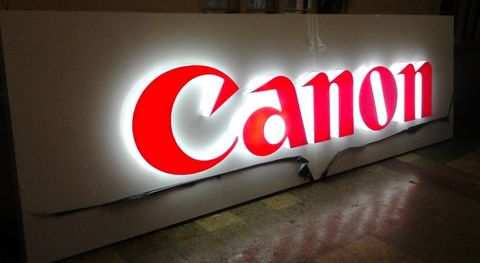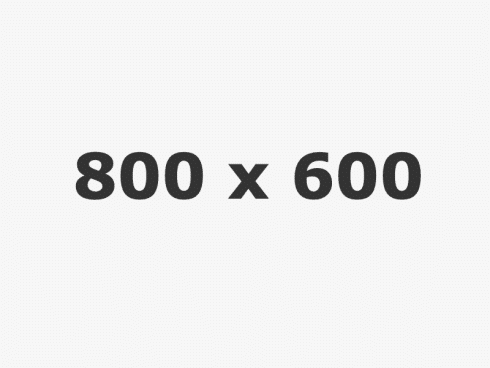Proper advertising design can redefine brand perception and customer engagement. Businesses and brands constantly seek innovative ways to make their ads stand out. Creative and strategic approaches lay the backbone of compelling advertisements.
Versatile, durable, and customizable acrylics can enhance advertising with a polished aesthetic. The material offers a modern edge by adapting to various designs and applications. This article dives into the potential of acrylic in modern advertising designs.
Acrylic Sheet in Advertising Design
It doesn’t matter whether you intend to use it for retail, events, or corporate branding. Acrylic holds the ability to craft eye-catching visuals for enhanced brand presence.
- Transparency: Acrylic has a crystal-clear clarity that rivals glass. It supports high-definition printing for display elements. The high-gloss finish incorporates a premium feel for additional visual appeal.
- Strength: Unlike fragile glass, acrylic offers superior impact resistance. It reduces the risk of damage in public spaces. Acrylic maintains structural integrity even under frequent handling or exposure.
- Customization: Acrylic can be cut, engraved, bent, or molded into nearly any shape. Infinite possibilities are available for creative advertising designs. It even supports a variety of finishing techniques.
- Flexibility: Acrylic’s adaptability allows for diverse advertising applications. Retail signs, POP (Point of Purchase) displays, exhibition stands, and interactive displays engage audiences through effects.
- Longevity: Weather-resistant acrylic is an excellent choice for outdoor advertising. It can withstand UV exposure to prevent fading. The same goes for rain and humidity for storefront signs/billboards.
- High-Quality Appeal: Paper or cardboard mostly appears temporarily. Acrylic’s contemporary aesthetic can instantly elevate branding campaigns. The material can even be recycled and repurposed.
No wonder many industries continue to leverage acrylic to transform their advertising efforts. From luxury brands to trade shows to restaurants and retail stores, acrylic displays have become common.
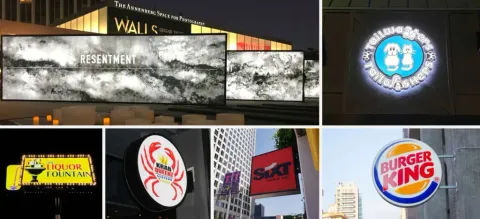
Creative Ways to Use Acrylic in Advertising
Acrylic has revolutionized the advertising landscape through high-impact visual solutions. Its versatility enables businesses to craft bold displays for brand recognition to drive engagement and conversions.
A. Acrylic Business Signs and Billboards
The transparent thermoplastic is an ideal material for signage and billboards. Brands choose acrylic for advertising to create vivid displays with modern sophistication. Further enhancement measures –
- Laser-etched text for a professional setting.
- Branded graphics with UV printing for vibrant colors.
- Embedded elements like metallic or LED inserts.
B. Backlit/Illuminated Acrylic Displays
About 92% of light transmission makes acrylic directly comparable to traditional glass. It makes backlit signs and illuminated billboards incredibly effective. Some creative strategies –
- LED backlighting for enhanced visibility at night, making ads shine in dim environments.
- Translucent or frosted acrylic signs enhance glowing effects for crisp and dynamic graphics.
- Outdoor durability ensures weather resistance, from direct sunlight to heavy rain.

C. Acrylic Display Stands
Retail environments can benefit greatly from acrylic display stands. Showcasing displays emphasize branding, new products, promotions, and seasonal campaigns. Design flexibility includes –
- Clear acrylic signs for unobstructed product visibility, keeping the focus on the items.
- Multi-layered acrylic display stands create an engaging depth effect to attract new customers.
- Branded acrylic stands align with corporate identity through logos and/or thematic colors.
D. Interactive Advertising with Acrylic
Acrylic seamlessly integrates technology as a powerful tool for interactive advertising. Brands leverage touch screens, motion sensors, and augmented reality (AR) within acrylic structures.
- Embedded touch screens for immersive brand storytelling.
- Motion sensors to react to customer presence and encourage engagement.
- Implement AR panels to bring digital elements into real-world ads.
- QR code for special offers is a popular choice for better customer experience.
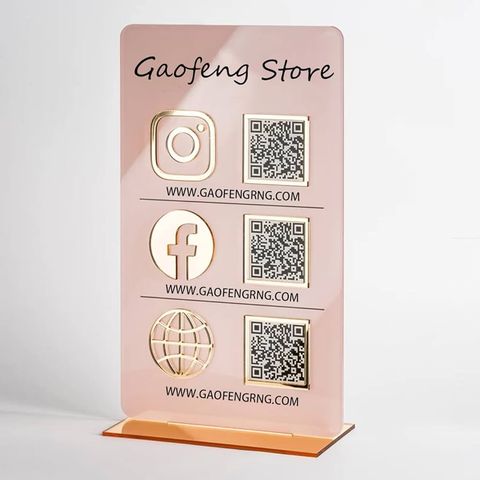
E. 3D and Layered Acrylic Designs
Traditional advertising can feel flat, but layered acrylic designs create depth and intrigue. It makes the advertisements more dynamic and attention-grabbing. Some creative ideas –
- Stacked acrylic sheets for a dimensional effect, making the ads pop.
- Color-infused layers add variety for enhanced brand messaging.
- Laser-cut 3D lettering makes signage more pronounced and impactful.
Drill holes with a suitable design tool to install or fill the plexiglass from different products. Hanging on an indoor wall for common uses based on your specific needs can induce a professional look.
Color and Light in Acrylic Advertising
Acrylic can display vibrant hues and integrate dynamic lighting. Such features render high benefits when appropriately implemented. You can craft visually striking ads to command attention for conversions.
01. Color Customization
Acrylic holds a broad spectrum of color possibilities. You can go from transparent to opaque as well as bold to subtle. It allows brands to craft displays that align perfectly with their identities and messages.
- Acrylic can be dyed, tinted, or painted to match specific branding requirements.
- Transparent acrylic allows for layered color effects, creating depth and sophistication.
- Frosted acrylic softens colors for a luxurious aesthetic for high-end retail branding.
02. Bold vs. Muted Colors
Such colors are heavily adored to command attention in competitive retail spaces. Muted and neutral tones, on the other hand, convey sophistication and trust.
- Red and yellow evoke urgency that is seen in sale promotions (McDonald’s and Coca-Cola).
- Neon and fluorescent acrylic create a futuristic, high-energy look, ideal for tech brands.
- Black and deep blue instill a sense of authority and reliability (e.g., luxury automotive brands).
- Pastel tones create a welcoming, gentle brand image, often used in wellness industries.
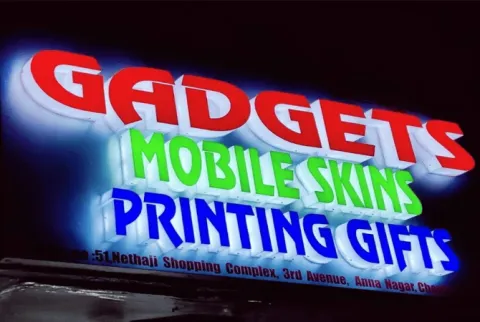
03. Color Psychology in Advertising
Brands use color psychology strategically to influence emotions and behaviors. Red stimulates appetite and excitement. It’s widely used in fast food and entertainment sectors. Green represents sustainability, which is ideal for eco-friendly campaigns and organic displays.
Blue conveys professionalism and trust. That’s why it’s so frequent in corporate branding and banking advertisements. Yellow is often considered synonymous with happiness and optimism. The color seems more common in child-focused advertising and lifestyle brands.
04. Lighting Effects in Acrylic Designs
It’s the secret weapon in acrylic advertising, adding depth, emphasis, and ambiance. LED backlighting, edge lighting, or internal illumination – lighting enhances visibility through a striking presence.
- LED Backlighting – Brightens signage from behind, creating a glowing effect that ensures messages stand out.
- Edge Lighting – Illuminates acrylic borders for sleek, futuristic appeal, commonly seen in tech retail.
- Internal Illumination – Embed light sources within acrylic structures, making letters or logos appear illuminated from within.
Lighted acrylic advertisements appear more dynamic than static prints. They’re perfect for outdoor billboards, storefront signage, and illuminated brand elements. It also adds a high-end feel.

How can Acrylic Ads Support Brand Identity?
Maintaining a strong, cohesive, and resolving brand identity is mandatory for businesses. Acrylic allows companies to create high-impact visuals to reinforce their images with longevity and sophistication.
a. Consistency with Brand Aesthetics
Keeping visual consistency across various advertising mediums is no simple task. Acrylic offers a wide range of customization options to integrate branding elements seamlessly into advertisements.
- Color Matching: Acrylic can be dyed or tinted to replicate exact brand colors. It ensures brand uniformity across all advertising elements.
- Textured Finishes: From glossy to matte, acrylic can be customized to fit a brand’s personality. And it can be luxurious, modern, or minimalistic.
- Brand Personalization: Logos, taglines, or thematic patterns can be embedded, laser-etched, or printed. Acrylic surfaces can hold them all.
Apple uses minimalist acrylic signage in its stores. Sleek finishes complement their modern branding. Such consistency across retail outlets reinforces brand recall and recognition.
b. Premium Look of Acrylic
High-end brands rely on aesthetic appeal to communicate prestige and exclusivity. Sleek acrylic can enhance perception through sophisticated signs, upscaled display cases, and illuminated advertising.
- High-gloss acrylic surfaces deliver a polished, luxurious feel, making brands appear premium.
- Frosted acrylic signage adds subtle elegance, commonly used by high-end boutiques and corporate offices.
- Edge-lit acrylic advertising enhances brand presence with a refined, high-tech glow.
Louis Vuitton features edge-lit acrylic branding in their flagship stores to reinforce brand recognition. Tesla employs black acrylic showroom displays to create a futuristic environment.
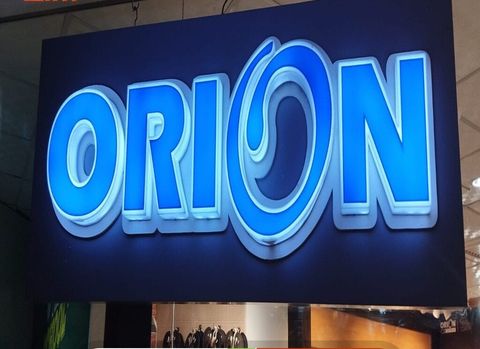
c. Long-Term Branding Impact
Acrylic not only enhances branding visually but also ensures a long-lasting brand presence. From everyday elements to sustainability commitment, advertisements can enjoy immense advantages.
- UV-resistant acrylic prevents colors from fading due to sun exposure for outdoor signage.
- It withstands humidity, rain, and temperature fluctuations for further longevity in outdoor applications.
- Acrylic signage lasts years, unlike cheap or defective alternatives, to reduce replacement costs.
Outdoor brands like Patagonia utilize weather-resistant acrylic signage in flagship stores. It reflects their commitment to durability and environmental responsibility.
Successful Ad Campaigns with Acrylic Signs
The go-to material surely elevates brands’ advertising through visually stunning experiences. Businesses continue to leverage acrylic to boost customer engagement, visibility, and sales.
Case Study #01 – Retail Store Display
Brand: Sephora
Campaign: Acrylic-based store display for new product launches
Objective: Boost engagement, elevate brand aesthetics, and promote sales
Sephora used custom acrylic signs (display stands) to showcase its latest makeup collections. Instead of traditional shelving, the brand introduced multi-layered transparent acrylic fixtures with embedded lighting. It allows each product to stand out with a premium finish.
- Customer engagement increased by 35% due to easy-to-view displays.
- Sales of featured products rose by 28% following the interactive store setup.
- Customers shared photos of the sleek displays to amplify brand awareness.
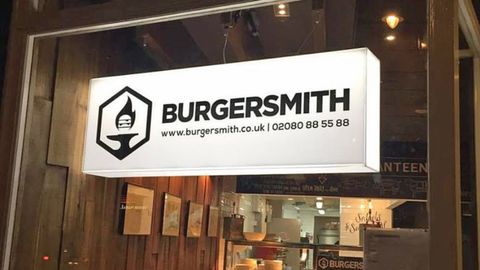
Case Study #02 – Common Uses of Outdoor Billboard
Brand: Audi
Campaign: High-impact acrylic billboard with integrated LED lighting
Objective: Increase brand visibility in a competitive urban advertisement space
Audi launched an acrylic-embedded outdoor billboard to promote its latest luxury vehicle. Unlike traditional billboards, Audi incorporated frosted acrylic layers with LED edge lighting. It made the ad glow at night while maintaining a sophisticated daytime appeal.
- Brand visibility increased by 42%, with more consumer interactions via digital engagement.
- Foot traffic to Audi showrooms grew by 22%, suggesting strong advertisement influence.
- The illuminated acrylic billboard stood out among other flat, traditional, boring advertisements.
Case Study #03: Interactive Installation for New Products
Brand: Samsung
Campaign: Trade show interactive acrylic installation with AR integration
Objective: Create an engaging, converting, and futuristic experience for demonstrations
Samsung introduced a touch-sensitive acrylic installation at CES to showcase its latest smart devices. Instead of static display boards, Samsung designed large transparent acrylic panels embedded with motion sensors and AR technology.
- Customer engagement increased by 58% compared to standard product showcases.
- Samsung’s installation was featured across multiple tech blogs, expanding online brand reach.
- Positive attendee feedback, with 92% of surveyed visitors expressing high satisfaction.
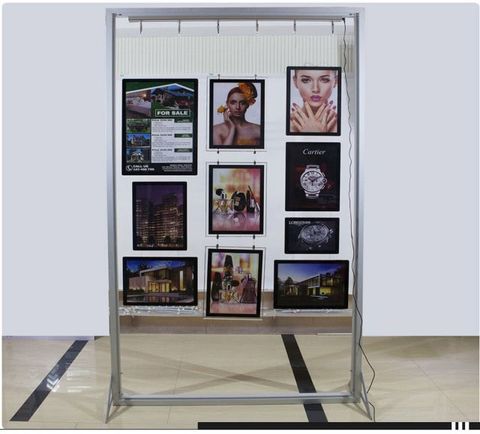
Tips for Designing Custom Acrylic Signs
Designing an effective acrylic display involves many steps to execute the process. It ranges from choosing fonts and colors to optimizing lighting and working with manufacturers.
A. Designing Acrylic Signage
Acrylic signage should be clear, bold, and strategically placed to maximize engagement. It’s the same for storefront signs, promotional stands, and wayfinding displays. Key considerations may include –
- Font Choices and Readability: Bold, sans-serif fonts (e.g., Helvetica, Futura) work best for maximum clarity. Avoid overly thin or script fonts, as they can become hard to read from a distance. Ensure proper letter spacing for better readability at any angle.
- Color Selection and Contrast: High-contrast color combinations improve legibility: white text on black acrylic or red text on clear acrylic. Glossy surfaces enhance vibrancy, while matte finishes reduce glare. Avoid colors that blend easily with backgrounds.
- Placement and Viewing Angles: Signs should be positioned at eye level for easy readability. For larger displays, test visibility from multiple angles and lighting conditions. Ensure adequate spacing around the signage to prevent visual clutter.

B. Optimizing Light and Color
Lighting and color enhance the impact of acrylic displays. It can immediately make or break a signage in terms of attractiveness, visibility, and engagement. Different techniques add depth and dimension.
Use cool tones (blue/white) for corporate branding to convey trust. Warm colors (red/orange) create high-energy advertising. Dimmable lighting options allow adjustments in different environments.
C. Working with Acrylic Manufacturers
Choosing the right manufacturer ensures your design is executed with precision. Collaborating effectively can save costs, improve quality, and align the final product with branding goals.
Always define the design requirements clearly. Provide dimension specifications, color preferences, and finishing details. Choose the right fabrication technique for durability and impact.
Choose laser cutting for intricate lettering or detailed logo designs. Engraving adds a premium look with depth and texture. Molding and shaping enable custom signage forms, making branding unique.
Aesthetic appeal, readability, strategic lighting, and expert fabrication are obligatory. Focus on clear fonts, contrasting colors, impactful lighting, and precision manufacturing.
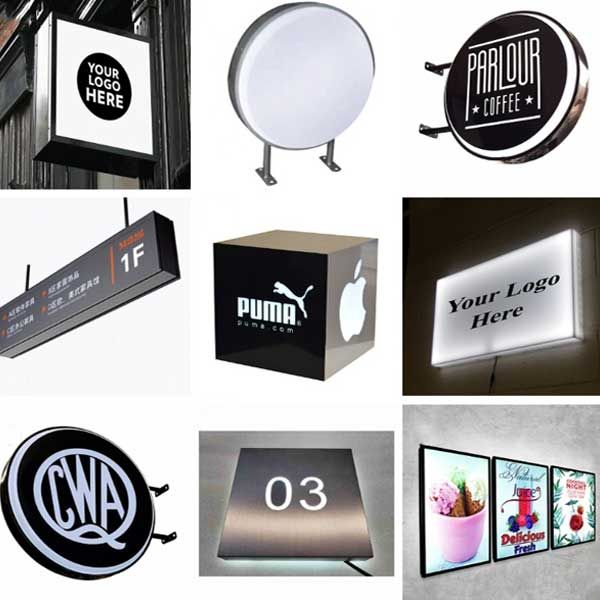
Cost Considerations for Acrylic Advertising
Acrylic advertising seems like a great investment for brands. While acrylic provides premium quality and long-term value, the cost can vary depending on size, customization, lighting effects, and fabrication.
01. Budgeting
Acrylic displays come in a wide range of costs, depending on various factors. The topmost key aspects related to the final amount are –
- Size: Larger acrylic displays cost more. That’s why large-format billboards cost a fortune in comparison to standard ones.
- Customization: Complex designs raise the amount by a significant margin. Laser-cut shapes and layered acrylic effects contribute to more expenses.
- Lighting: LED and/or backlit features surely add some expenses. Edge-lit designs cost less than fully illuminated acrylics.
- Fabrication: Advanced techniques for further precision can get quite costly. Engraving, molding, and second surface printing aren’t exactly cost-saving.
- Thickness: Thicker acrylic panels (over 10+ mm) start to add cost exponentially. Stick to a lower thickness to save the amount.
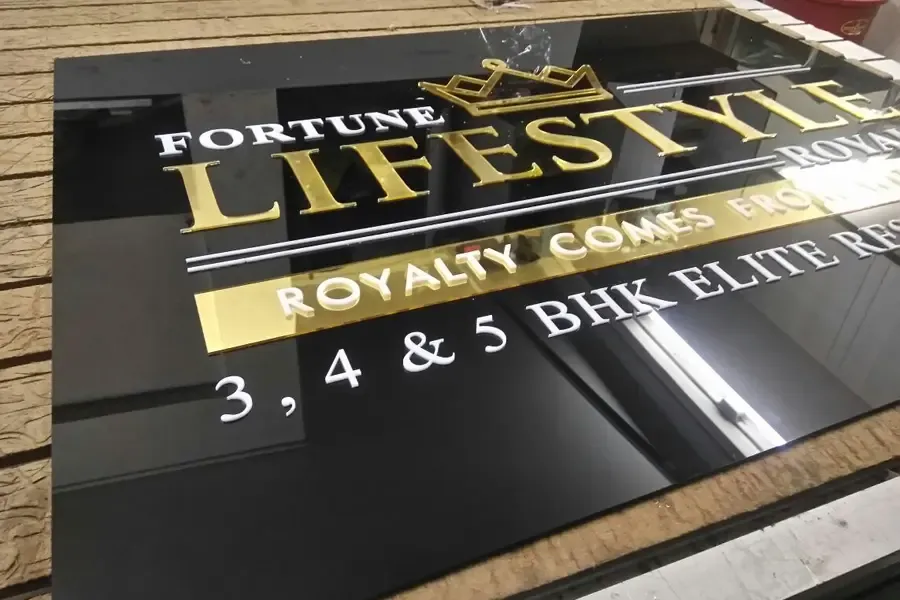
02. Balancing Creativity
- Simple but strategically placed acrylic signs can achieve high engagement without excessive costs.
- Instead of full LED integration, use edge lighting to reduce expenses while maintaining visual appeal.
- Implement standard acrylic sheets instead of custom formulations unless necessary.
For example, a startup retail brand minimizes costs by using mid-sized acrylic signage with UV-printed branding. Such a strategy can save 30% in manufacturing costs while still maintaining an elegant display.
03. Return on Investment (ROI)
- High-quality signage can improve brand recall by 47%. The initial cost of acrylic is offset by –
- Extended lifespan compared to paper or vinyl without any frequent replacements.
- Premium acrylic signage can increase customer attraction by 25%, boosting sales.
- Recyclable acrylic aligns with sustainability objectives to improve brand perception.
Acrylic advertising is an investment in durability, visual appeal, and consistency. Strategic budgeting for customization, lighting, and fabrication can maximize ROI for businesses with satisfying cost efficiency.
Frequently Asked Questions (FAQs)
1. What makes acrylic more effective for advertising displays?
Acrylic is superior to regular plastic due to its optical clarity, durability, and premium appearance. The material doesn’t yellow over time while maintaining the finish.
2. Can acrylic be used for temporary advertising campaigns?
Acrylic is versatile enough for temporary and permanent campaigns. Lightweight modular panels can be assembled for short-term promotions. Durable outdoor acrylic signage provides long-term solutions.
3. How does acrylic compare to glass in advertising displays?
Acrylic is lighter, more impact-resistant, and easier to shape than glass. That’s why it’s an ideal choice for advertising applications where flexibility is key.
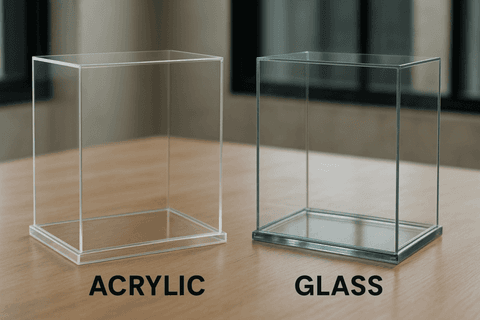
4. What are the standard printing techniques for acrylic advertising?
The most effective printing methods include UV printing, screen printing, and vinyl overlays. These techniques provide high-resolution graphics, scratch-resistant finishes, and long-lasting color vibrancy.
5. Can acrylic signage be eco-friendly?
Yes. Many manufacturers produce recycled acrylic to reduce waste and support sustainability. Acrylic displays last longer than disposable materials to minimize environmental impact.
6. What maintenance is required for acrylic advertising displays?
You must keep acrylic signage in pristine condition through proper maintenance. Use microfiber cloths and non-abrasive cleaners to remove dust and fingerprints. Also, avoid harsh chemicals like ammonia.
7. How can acrylic be shaped for unique advertising designs?
Acrylic can be laser cut, molded, bent, and engraved to create custom shapes, 3D lettering, layered signs, and interactive displays. Such flexibility makes it perfect for innovative brand storytelling.
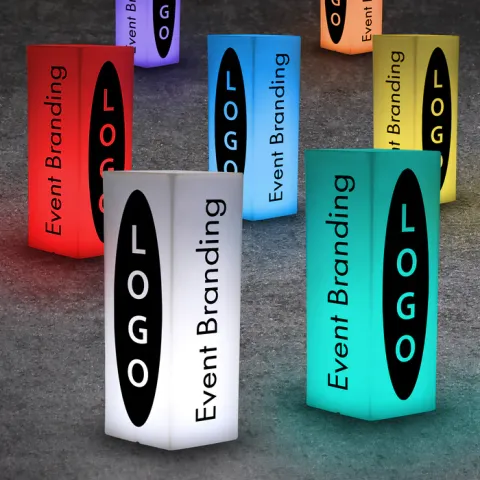
Conclusion
Making an immediate impression is a must to make a stand in the competitive advertising landscape. You must incorporate boldness and innovation to circulate your story or message. And acrylic has been the transformative force to push the boundaries of visual impact.
Make Your Advertising Display Stand Out with JUMEI
Partnering with a trusted, reliable, expert manufacturer is no less important. Jumei Acrylic holds a massive collection of standard solutions. Even our custom solution blends innovation and performance for satisfaction. Contact us to know how our experience can help.

